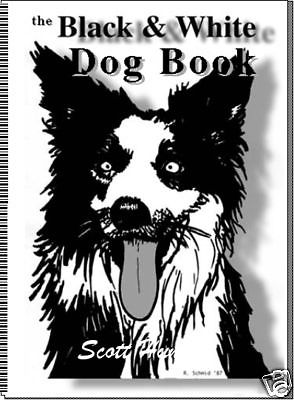Introducing our first guest author, Scott Hunt. Scott is a dog trainer based in Tasmania. He has had extensive experience with training working dogs, including his beloved Kenny Dog Wonder. He has gone on to write The Black and White Dog Book which can be purchased online and also writes a column as The Dog Grumbler for the Eastern Shore Sun newspaper. Scott starts our series of articles off with advice on Raising a Puppy.
Usually, when people want a pure-bred dog they start with a pup from a breeder. Many trainers prefer to start from scratch with a ‘blank slate’, hoping to avoid mistakes and raise a dog with minimal vices. Of course this means a year or two of frustration and hard work that might be avoided when you acquire a mature dog. In my experience, the majority of dog (or dog owner) problems stem from mistakes made in the first few months of a dog’s life, usually by owners who presumed they needed no advice. If you are getting a pup, here are some things to keep in mind:
A pup needs 6 to 8 weeks in the litter with it’s mother and siblings to learn to be a dog. This is an important time and should not be cut short, but it pays to meet and handle your pup during this time. I recommend sleeping in an old T shirt and then leaving it with the litter early in the pup’s life. When you eventually come to collect your pup it will be familiar with your smell and you can take the T shirt back home to identify the pup’s new sleeping place. The T shirt will now bear comforting smells from the litter which should make the switch to a new home easier.
The next 8 weeks or so are the pup’s imprint period. You need to patiently expose your pup to everything you expect it to deal with in later life during this period; people, traffic, water, other animals and so on. Exposure to well-behaved dogs is also valuable. Don’t expect miracles, just calmly introduce the pup to these new things in a controlled environment so it comes away with a happy memory of each experience. If it comes from a breed that will need clipping, introduce it to the groomer during this time.
It’s important to remember that your pup is learning about the whole world and it’s place in it. This takes time and patience, especially at first. If you are patient and consistent your dog will get better at learning. If you are patient and consistent, your dog will learn how to fit into your life and human society.
Your dog needs to learn your routines. It needs to learn to focus on you and stay close to you. It needs to learn to wait for you, wait with you and travel with you. If you expect your dog to travel in cars, start early, with short trips at first. Your dog should be encouraged to look out through the windows and windscreen; it needs to learn to look at what’s passing outside and it needs to learn to look forward, not backwards, to avoid motion sickness.
Your dog needs to learn to eat bones. There’s a big physical workout for a dog with larger bones as it learns to apply it’s specialised teeth and jaws. I firmly believe dogs and their wolf ancestors have been eating human leftovers, particularly bones, for hundreds of millennia, that this is a domestic dog’s natural diet, but it still needs to practise and learn the skill. Neglect this and your dog will still be drawn to bones, but may try to eat them too quickly. This can result in splinters and injury.
Give your dog a name it can hear well. Bob and Ralph are bad names; Dexter, Lassie, Pluto and Rin Tin Tin are good ones. Use hand signals in conjunction with your spoken commands. Take your dog out to smell stuff. The more new smells your dog soaks up in your company the better it will bond with you.
Get your pup to a vet. Its mothers milk will protect it from most things, but once that finishes your pup needs vaccinations. While you are there, make an appointment for your next visit. Tag your dog with your phone number.
Your pup will destroy something valuable to you. Ask any dog owner. This is nature testing your patience. You can be upset, but you must forgive and move on. Grumble when you are displeased, sing and dance when you are happy. Be consistent. Have faith. Show your pup patiently and repetitively the behaviour you want and it will reward you beyond your dreams.

